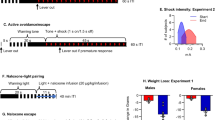Abstract
Male and female Wistar rats were treated with different doses of vasopressin (0.05, 0.25, 1.25, 3.75 and 6.25 μg/kg) after responding had stabilized on either a differential reinforcement of low rate 15 s (DRL 15 s) or a differential reinforcement of high rate 0.75 s (DRH 0.75 s) schedule of reinforcement. Low to moderate doses of vasopressin did not affect response rates, response efficiency or the number of reinforcers obtained during vasopressin sessions on both the DRL and DRH schedules. Administration of 6.25 μg/kg vasopressin reduced low response rates and the number of reinforcers obtained during vasopressin sessions, but increased response efficiency. High response rates and response efficiency were reduced after administration of 3.75 and 6.25 μg/kg vasopressin, while the number of reinforcers obtained during vasopressin sessions was reduced at 6.25 μg/kg. Sex differences in the effects of vasopressin were not observed on either schedule.
Similar content being viewed by others
References
Alliot J, Alexinsky T (1982) Effects of posttrial vasopressin injections on appetitively motivated learning in rats. Physiol Behav 28:525–530
Alliot J, Alexinsky T (1983) Repeated post-trial administration of vasopressin impairs subsequent differential reinforcement of low rates (DRL) performance. Behav Process 8:345–362
Dews PB, Wenger GR (1977) Rate dependency of the behavioral effects of amphetamine. In: Thompson T and Dews PB (Eds) Adv Behav Pharmacol (vol 1) Academic Press, New York
Ettenberg A, Le Moal M, Koob GF, Bloom FE (1983a) Vasopressin potentiation in the performance of learned appetitive task: reversal by a pressor antagonist analog of vasopressin. Pharmacol Biochem Behav 18:645–647
Ettenberg A, van der Kooy D, Le Moal M, Koob GF, Bloom FE (1983b) Can aversive properties of (peripherally-injected) vasopressin account for its putative role in memory? Behav Brain Res 7:331–350
Fehm-Wolfsdorf G, Born J, Voigt KH, Fehm HL (1984) Human memory and neurohypophyseal hormones: opposite effects of vasopressin and oxytocin. Psychoneuroendocrinology 9:285–292
Hostetter G, Jubb SL, Kozlowski GP (1977) Vasopressin affects the behavior of rats in a positively-rewarded discrimination task. Life Sci 21:1323–1328
Hurwitz HMB, Davis H (1983) Depriving rats of food: a reappraisal of two techniques. J Exp Anal Behav 40:211–213
Janaky T, Laszlo FA, Sirokman F, Morgat JL (1982) Biological half-life and organ distribution of [3H] 8-arginine vasopressin in the rat. J Endocrinol 93:295–303
Jenkins JS, Mather HM, Coughlan AK (1982) Effects of desmopressin on normal and impaired memory. J Neurol Neurosurg Psychiatry 45:830–831
Koob GF, Dantzer R, Rodriguez F, Bloom FE, Le Moal M (1985) Osmotic stress mimics effects of vasopressin on learned behavior. Nature 315:750–752
Laczi F, Valkusz Zs, Laszlo FA, Wagner A, Jardanhazy T, Szilard J, Telegdy G (1982) Effects of lysine-vasopressin and 1-deamino 8-d-arginine-vasopressin on memory in healthy individuals and diabetes insipidus patients. Psychoneuroendocrinology 7:185–193
Le Boeuf A, Lodge J, Eames PG (1978) Vasopressin and memory in Korsakoff syndrome. Lancet II:1370
Le Moal M, Dantzer R, Mormede P, Baduel A, LeBrun C, Ettenberg A, van der Kooy D, Wenger J, Deyo S, Koob GF, Bloom FE (1984) Behavioral effects of peripheral administration of arginine-vasopressin: a review of our search for a mode of action and a hypothesis. Psychoneuroendocrinology 9:319–341
Le Moal M, Koob GF, Koda LY, Bloom FE, Manning M, Sawyer WH, Rivier J (1981) Vasopressor receptor antagonist prevents behavioral effects of vasopressin. Nature 291:491–493
Messing RB, Sparber SB (1983) Des-Gly vasopressin improves acquisition and slows extinction of autoshaped behavior. Eur J Pharmacol 89:43–51
Oliveros JC, Jandali MK, Timsit-Berthier M, Remy R, Benghezal A, Audibert A, Moeglen JM (1978) Vasopressin in amnesia Lancet I:42
Rigter H, Popping A (1976) Hormonal influences on extinction of conditioned taste aversion. Psychopharmacology 46:255–261
Sahgal A (1983) Vasopressin retards the acquisition of positively reinforced lever pressing in homozygous Brattleboro rats. Regulat Pept 5:317–326
Sahgal A, Wright C (1983) A comparison of the effects of vasopressin and oxytocin with amphetamine and chlordiazepoxide on passive avoidance behavior in rats. Psychopharmacology 80:88–92
van Haaren F, Heinsbroek RPW, Louwerse A, van de Poll NE (1986) d-Amphetamine differentially affects low, but not high response rates of male and female Wistar rats. Psychopharmacology (in press)
van Haaren F, van de Poll NE, van Oyen HG (1985) Age effects on passive avoidance behavior of vasopressin-deficient Brattleboros. Physiol Behav 34:115–117
van Haaren F, van Zanten S, van de Poll NE (1986) Vasopressin disrupts radial-maze performance in rats. Behav Neural Biol (in press)
van Ree JM, de Wied D (1981) Brain peptides and psychoactive drug effects. In: Israel Y, Claser FB, Kalant H, Popham RF, Schmidt W, Smart RG (Eds) Research advances in alcohol and drug problems. Plenum Press, New York
van Wimersma Greidanus TjB, Bohus B, Kovacs GL, Versteeg DHG, Burbach JPH, de Wied D (1983a) Sites of behavioral and neurochemical action of ACTH-like peptides and neurohypophyseal hormones. Neurosci Biobehav Rev 7:453–463
van Wimersma Greidanus TjB, van Ree JM, de Wied D (1983b) Vasopressin and memory. Pharmacol Ther 20:437–458
Williams AR, Carey RJ, Miller M (1983) Effects of vasopressin on open field and activity behavior of the vasopressin-deficient (Brattleboro) rat. Peptides 4:717–720
Winer BJ (1971) Statistical principles in experimental design, McGraw-Hill Book Company, New York
Author information
Authors and Affiliations
Rights and permissions
About this article
Cite this article
van Haaren, F., Heinsbroek, R.P.W., Louwerse, A. et al. Vasopressin has general rate-decreasing effects on schedules maintaining either high or low response rates. Psychopharmacology 89, 69–72 (1986). https://doi.org/10.1007/BF00175192
Received:
Revised:
Issue Date:
DOI: https://doi.org/10.1007/BF00175192




